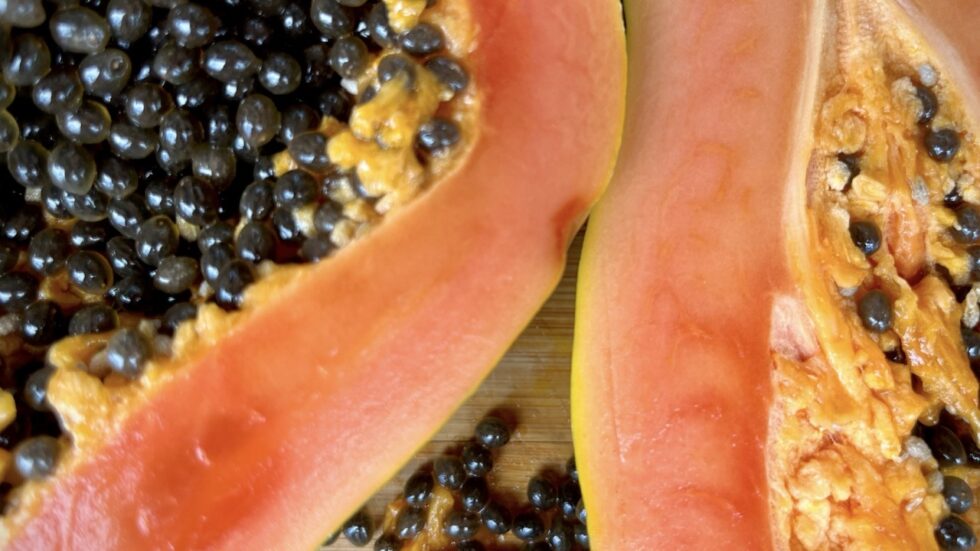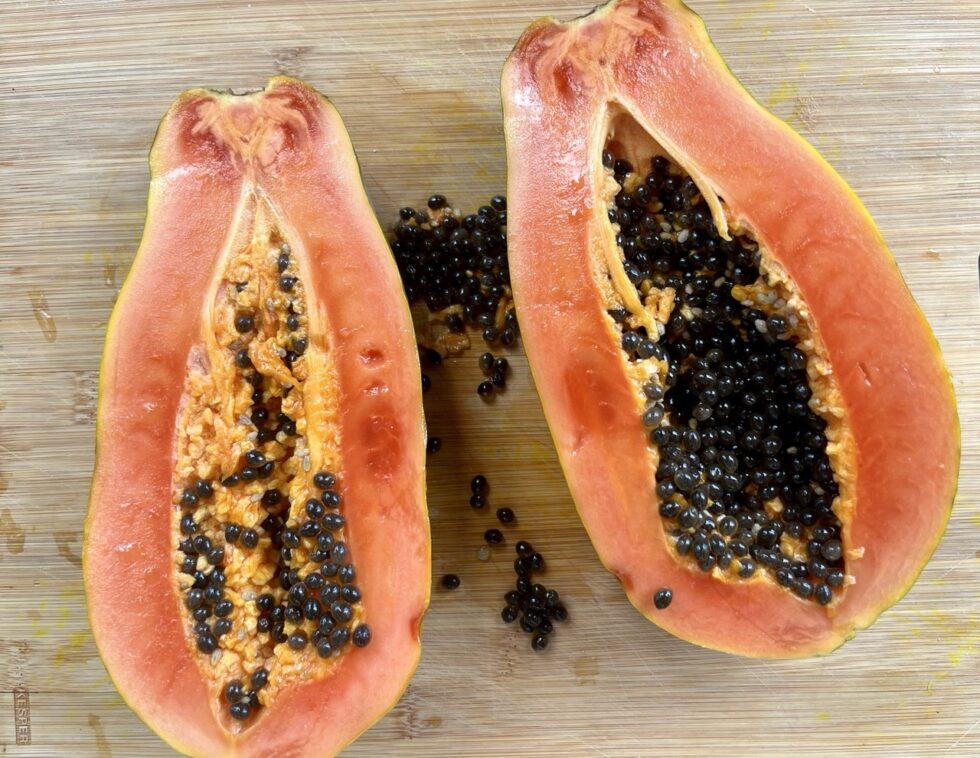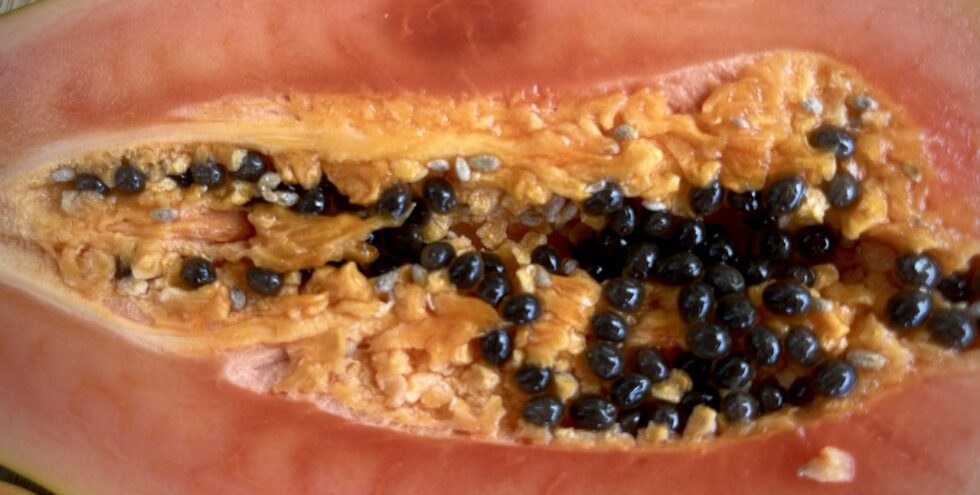Papaya and Its Seeds – A Tropical Superfruit with Dual Powers

Papaya (Carica papaya) is a tropical fruit native to Central and South America. Today, it is grown in many warm regions across the globe and is recognized not only as a delicious fruit but also for its impressive nutritional and medicinal properties. Rich in enzymes, vitamins, and antioxidants, papaya has earned the title of a "superfruit" among health professionals and nutritionists. Increasing attention is also being given to papaya seeds, which are traditionally used in herbal medicine. This is reported by G.Business.

What Is Papaya and Why Is It Healthy
Papaya is an oval-shaped tropical berry that can weigh between 400 g and 2 kg. Its flesh is soft and orange to pink in color, surrounded by hundreds of small black seeds. The taste is mildly sweet, with a musky, melon-like note.
Top Health Benefits of Papaya
- Contains papain, an enzyme that helps digest protein
- Rich in vitamin C (60 mg/100 g), supporting the immune system
- Beta-carotene promotes healthy skin and vision
- Low-calorie (about 43 kcal/100 g)
- Low sugar (5.9–8 g/100 g), suitable for diabetics
- Soothing for the stomach and intestines
Papaya is recommended for people with acidity issues, digestive disorders, children, and seniors. It is best consumed raw – in salads, smoothies, or puréed.
Papaya Seeds – Tiny but Potent
Inside ripe papayas, the seeds are enclosed in a gelatinous sac. Though often discarded, they are used in traditional medicine for their anti-parasitic, antimicrobial, and liver-supporting properties.
Active Ingredients in Papaya Seeds
- Papain – aids in protein digestion
- Benzyl isothiocyanate – antimicrobial, anti-parasitic
- Glucosinolates & flavonoids – antioxidant properties
- Insoluble fiber – promotes bowel movement
- Bitter alkaloids & oils – may affect gut flora and liver
How to Use Papaya Seeds Safely Papaya seeds should be consumed in very small amounts. Their sharp flavor is similar to pepper and horseradish. Their effects can be felt after consuming just a few seeds.
Usage Tips
- Raw: chew 1–3 seeds daily (well crushed)
- Dried and ground: use as pepper substitute in soups and salads
- In smoothies: add a small pinch
- Avoid heating: high temperatures destroy active enzymes
- Use short-term: 3–5 days with a break afterward

Who Should Avoid Papaya Seeds
Due to their bioactive compounds, papaya seeds may not be safe for everyone.
Contraindications:
- Children under 12 – too strong for their digestive system
- Pregnant and breastfeeding women – risk of uterine stimulation
- Liver or kidney disease – potential organ stress
- Blood thinners – possible interaction with anticoagulants
- IBS or ulcers – seeds can irritate the mucosa
Nutritional Profile – Papaya Flesh (per 100 g)
| Nutrient | Amount | Benefit |
|---|---|---|
| Calories | 43 kcal | Light, diet-friendly |
| Sugar | 5.9–8 g | Low glycemic load |
| Vitamin C | 60 mg | Antioxidant, immune booster |
| Beta-carotene | 950 µg | Skin, eye health |
| Folic acid | 37 µg | Cell division, pregnancy support |
| Potassium | 182 mg | Blood pressure regulation |
| Magnesium | 21 mg | Nerve and muscle function |
| Fiber | 1.7 g | Digestion, satiety |
| Papain | active | Protein digestion, anti-inflammatory |
Papaya in Everyday Life – For All Ages
Papaya is one of the few tropical fruits that can be safely integrated into the daily diet across all age groups. For children over 10 months, mashed ripe papaya offers a gentle introduction to fruit-based fiber and vitamin C. Adults benefit from its digestive enzymes, especially when consumed after protein-rich meals or during periods of gastrointestinal stress. Seniors often appreciate papaya for its easy-to-chew texture, natural support for bowel regularity, and high antioxidant content that helps protect cellular health. Even individuals with type 2 diabetes can enjoy moderate portions thanks to its low glycemic impact. Whether served fresh, blended into smoothies, or mixed with yogurt, papaya fits seamlessly into various dietary routines.
For Children
- From 10 months: mashed form only
- Always ripe fruit, without seeds or skin
- Helps regulate digestion gently
For Adults
- Eat raw for maximum benefits
- Helps with heavy meals or stomach discomfort
- Ideal during detox diets or low-sugar regimens
For Seniors
- Soft and easy to chew
- Supports gut motility
- Boosts immune system naturally
For Diabetics
- Moderate sugar, low glycemic index (~60)
- Can be paired with yogurt or protein
- 100 g ≈ under 1 BE – fits diet plans
- Avoid dried papaya – sugar content too high
Conclusion: Superfruit with Dual Benefits Papaya is more than just a tropical treat – it’s a powerhouse of enzymes, vitamins, and fiber, aiding digestion, immunity, and metabolic balance. Its seeds offer medicinal potential but should be consumed cautiously and in moderation. Papaya deserves a regular spot in a health-conscious diet, particularly for those managing digestion or seeking a low-sugar fruit option.
Stay connected for news that works — timely, factual, and free from opinion — and insights that matter now: 5 foods you should never mix with alcohol – doctors warn